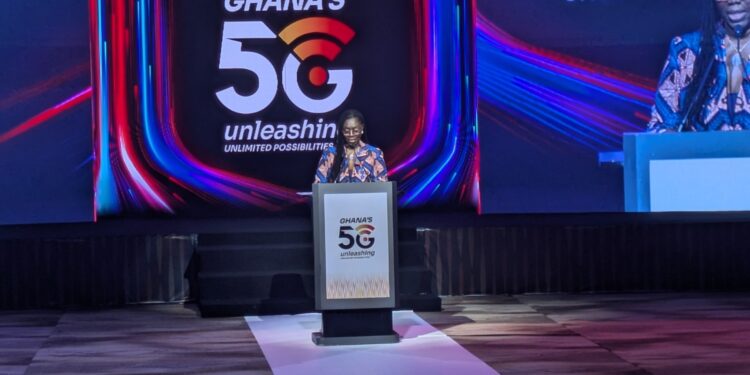Ghana Aims for Inclusive 5G Rollout; Sets Ambitious 2025 Target for Universal 5G Coverage
Further asserting that, a shared 5G network would prevent network operators from prioritizing only high-demand, commercial areas.

Ghana’s Minister for Communications and Digitalization, Ursula Owusu-Ekuful, has reiterated government’s commitment to deploying 5G connectivity to rural and underserved communities across the country.
Speaking on the strategy adopted by government and the implementing company, Next Generation Infrastructure Company (NGIC) in the deployment of the 5G network, Mrs Owusu-Ekuful explained that a shared network model was essential to ensuring that the goal of universal connectivity is achieved.
- Advertisement -
Further asserting that, a shared 5G network would prevent network operators from prioritizing only high-demand, commercial areas.
- Advertisement -
“Without the shared network, service providers who secure the spectrum would limit deployment to commercially viable areas, we wanted high-speed broadband services available nationwide simultaneously and not just reliant on an operator’s rollout strategy. Our commitment to universal connectivity drove us to adopt this model, which includes both 5G and 4G access,” she remarked.
With the shared network model, infrastructure will be centrally accessible allowing all network operators to extend coverage without bearing individual expansion costs. This setup removes a common obstacle often cited by operators – the high costs of expanding network coverage to rural areas.
“Operators now have the infrastructure available to them, all they need is to provide service using the infrastructure already provided to reach subscribers nationwide,” she added.
Ghana’s phased rollout of the 5G network will begin with major commercial centers, with the government targeting nationwide coverage by the end of 2025.
The shared network model is scalable, incorporating satellite technology to connect even the hardest-to-reach areas. According to Mrs Owusu-Ekuful, the infrastructure can also link with the existing rural telephony network, broadening access to unserved and underserved regions “within the shortest possible time.”
- Advertisement -
This comprehensive approach, she added, aligns with Ghana’s vision for a digitally inclusive society, ensuring that all Ghanaians benefit from the ongoing digital transformation.
Ghana today, November 1, 2024, launched its much-anticipated 5G network.
The fifth generation of wireless technology, 5G, promises significantly higher internet speeds, faster data transfers, and improved network reliability compared to previous generations.
It is expected to deliver up to 10 times the speed of 4G Plus services, marking a major upgrade in connectivity. Enhanced capacity and lower latency will enable faster downloads and more consistent performance across industries.
The initiative, designed to provide affordable high-speed mobile broadband across Ghana, is expected to drive digital transformation, particularly in areas such as healthcare, education, and financial services.
The 5G license has been awarded to Next Gen InfraCo NGIC, a newly created shared infrastructure company co-promoted by the government and a consortium of firms, including Ascend Digital, K-NET, Radisys, Nokia, Tech Mahindra, AT Ghana, and Telecel Ghana.
The collaborative effort is expected to deliver cost-effective 5G services across the country, ensuring broader access to next-generation mobile connectivity.
Source:norvanreports.com
- Advertisement -



